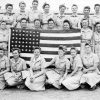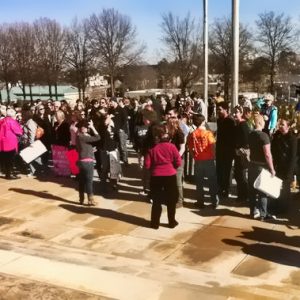calsfoundation@cals.org
Women's Project
The Women’s Project began in 1980 in Eureka Springs (Carroll County) as the Arkansas Women’s Training Project (AWTP) and was incorporated as the Women’s Project in 1985. It was founded by Suzanne Pharr, a VISTA volunteer, with Bob Torvestad and Freeman McKindra of VISTA providing its first staff: five VISTA volunteers who were located throughout the state. The organization was sponsored by the Northwest District of the United Methodist Church. Initial funding came from the National Women’s Division of the United Methodist Church and the Winthrop Rockefeller Foundation. A feminist, anti-racist organization, the AWTP worked with women in small towns throughout Arkansas to gain skills to confront local issues.
In 1982, the Women’s Project relocated to Little Rock (Pulaski County) in order to reach more women in the Delta and established itself as a multi-racial, multi-generational organization whose goal was to eliminate systemic sexism and racism, focusing primarily on economic injustice and violence against women. Evangeline K. Brown, a civil rights leader in Dermott (Chicot County), was an important adviser to its rural work.
Some of the projects undertaken in the 1980s and 1990s included organizing the Arkansas Coalition Against Domestic Violence; tracking far right hate groups such as the Ku Klux Klan and Posse Comitatus (in affiliation with the Center for Democratic Renewal); introducing and providing training sessions on child sexual assault throughout the state; working weekly with women in prison on domestic violence, economic opportunity, and HIV/AIDS (led by Kerry Lobel); non-traditional jobs training (led by Janet Perkins); monitoring and documenting violence against Jews, LGBT people, and people of color, as well as the murders of women, and publishing a detailed log of these crimes each year (led by Suzanne Pharr and Kelly Mitchell-Clark); transporting children of women prisoners from throughout the state to see their mothers (led by United Methodist Women); providing political education and organizing for disability rights (led by Judy Matsuoka); presenting (in the 1980s) workshops and speeches about the connections between sexism, racism, and homophobia, and (in the 1990s) about the rise of the Right (led by Suzanne Pharr).
In its focus on cultural organizing for social change, the Women’s Project created a library of more than 5,000 books and media (led by Lynn Frost); organized the first black women’s conference in the state (led by Janet Perkins, Kelly Mitchell-Clark, and Damita Marks); brought Sweet Honey in the Rock, Casselberry and Dupree, Jane Sapp, Pam Ward, and Odetta to Little Rock for public performances and community conversations; organized annual lesbian retreats at a state park; hosted a monthly coffeehouse with visiting artists and an open mic; created a women’s film series; held a national domestic violence conference; published a newsletter of political analysis six times a year; and promoted and sold the books Homophobia: A Weapon of Sexism and In the Time of the Right: Reflections on Liberation.
In its third decade, the Women’s Project became a volunteer organization with a continued commitment to working with women and their families. Since its inception, the Women’s Project has established many partnerships and collaborations. In 2012, the organization joined the newly formed Arkansas Coalition for Reproductive Justice. In January 2013, the Arkansas Coalition for Reproductive Justice spearheaded an effort to bring together over 500 women for an event on the steps of Arkansas State Capitol.
The Women’s Project is also part of the Southern Movement Assembly—a collaboration of Southern organizations with common political, economic, and social goals aiming to implement strategic and collective action plans for building power across the South. In 2012, the Southern Movement Alliance and their partners collaborated on voter education, registration, and activation through the We All Count Campaign. The campaign was an effort led by grassroots organizations with the Southern Movement Alliance to increase voter education and registration in under-represented communities. The campaign also trained new organizers and established the Southern People’s Plan in order to encourage the local communities to keep working beyond the national elections.
The Women’s Project has partnered with the Philander Smith University Social Justice Initiative in developing the National Student Bill of Rights for All Youth (NSBR). The NSBR is an effort to bring together youth from across the country to define a youth vision for education and social justice. Young people from different cities have begun developing local bills and working together to write a national bill that will serve as a unifying document for youth nationwide and a driving force for youth movement building.
The project is composed of two transitional teams. The Board Transitional Team manages the daily administrative and operational needs of the organization. The second team is the Community Listening and Programmatic Transitional Team. Because the project has no paid staff in the twenty-first century, all activities are implemented by volunteers. The Women’s Project offers its Evangeline K. Brown Award to someone who has “made a difference in the local and global community.”
For additional information:
Boulden, Jenny. “Women’s Work.” Arkansas Democrat-Gazette, May 3, 2022, pp. 1E, 6E. Online at https://www.arkansasonline.com/news/2022/may/03/womens-work/ (accessed May 3, 2022).
The Women’s Project [Online Exhibit]. https://www.womensprojectstory.org/ (accessed March 4, 2022).
Women’s Project Collection. University of Central Arkansas Archives and Special Collections, Conway, Arkansas. Finding aid (including digital copies of the Transformation newsletter) online at http://uca.edu/archives/m95-03-arkansas-womens-project-collection/ (accessed May 3, 2019).
Rachel Hoge
Conway, Arkansas
Suzanne Pharr
Little Rock, Arkansas
 Civil Rights and Social Change
Civil Rights and Social Change Divergent Prosperity and the Arc of Reform, 1968–2022
Divergent Prosperity and the Arc of Reform, 1968–2022 Women
Women Rally for Reproductive Justice
Rally for Reproductive Justice 




Comments
No comments on this entry yet.